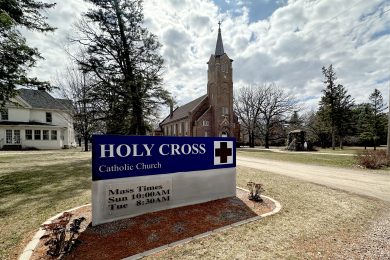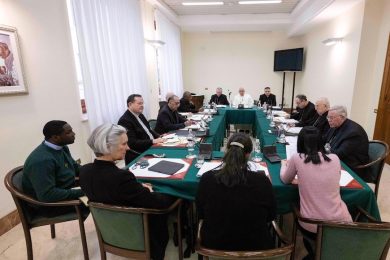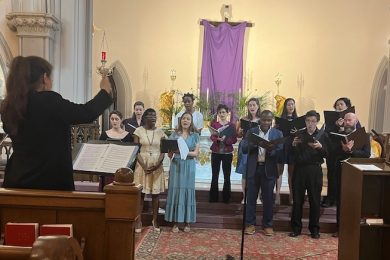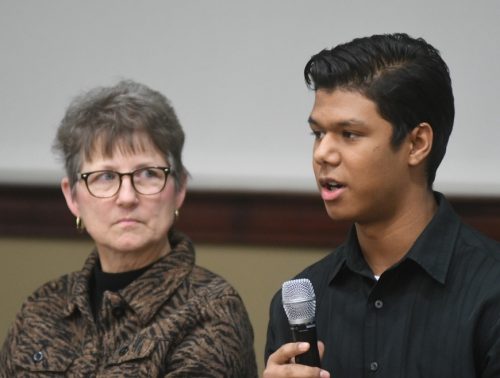Nathaniel Walz is a dreamer. As a 16-year-old sophomore at Cathedral High School in St. Cloud, he is fascinated with algebra, calculus, chemistry, physics, bioengineering and biochemistry. Next year, he plans to take college-level courses.
In addition to his studies, he works on a dairy farm to save up for college tuition. His dream is to attend MIT — Massachusetts Institute of Technology — where he wants to study aerospace and bioengineering.
He is also a “Dreamer,” a term used to describe undocumented youth who were brought to the United States as children. The DREAM Act — Development, Relief and Education for Alien Minors Act — was introduced in 2001 and would have offered those who had arrived in the United States illegally as children the chance of permanent legal residency. Although it repeatedly failed to pass, the name “Dreamers” stuck.

In 2012, President Barack Obama created by executive order a program called Deferred Action for Childhood Arrivals, known as DACA, to allow the children the temporary ability to live, study and work in the U.S. Walz, who was born in Maracay, Venezuela, has lived in the U.S. since he was 2 years old. And until September 2017, he was protected from deportation under DACA.
“My parents made the sacrifice of leaving everything behind,” Walz said. “They brought me and my sister here in 2004 and since then I have been able to take advantage of good education. DACA has allowed me to accomplish this dream. DACA allows me to get the best education and to do what I love.”
In September 2017, President Donald Trump rescinded the DACA program and gave Congress six months to come up with an alternate plan. DACA was set to expire in March, impacting at least 700,000 people.
Earlier this month, a U.S. District Court judge in San Francisco temporarily blocked Trump’s decision to rescind DACA, saying the U.S. government must start accepting renewal applications again from current beneficiaries of the program. The ruling, which was appealed to the U.S. Supreme Court, also said the government does not have to accept applications from those not currently covered by DACA.
Walz was part of a panel from the civil rights group La Asamblea de Derechos Civiles, a faith-based immigrant empowerment organization, who presented a forum at the College of St. Benedict’s Gorecki Center Jan. 18. The discussion was the first in a series of three talks hosted by the CSB/SJU Latino/Latin America Studies program called, “Immigrant Voices in Conversation about Justice.”
“Today I am a youth leader with Asamblea because I am fighting to keep DACA and to push for the clean Dream Act,” Walz said. “I have five younger siblings who are counting on me to be a role model and I can’t let them down. I can’t let my parents’ sacrifice and hard work go to waste. I need this program to survive in this country that has meant so much to my family.”
According to the National Immigration Law Center, a clean Dream Act would provide a path to citizenship for those who entered the U.S. before age 18, have been in the U.S. for four years and can pass a background check.
The pathway to citizenship would mean that qualifying applicants would first qualify for a conditional permanent residence status. Under CPR status, they would have to work, join the military, earn a higher education degree or meet a hardship exception.
After eight years and after meeting these and other requirements, they would obtain lawful permanent resident status. After five years in LPR status, they would be eligible to apply for U.S. citizenship. DACA recipients would be on a faster track to citizenship.
Bruce Campbell, professor and director of Latino/ Latin America Studies at the colleges, organized the theme-based series. This year’s theme is justice. “The premise of the series is that the national conversation about immigration is frequently not a conversation in which immigrants have a voice,” Campbell said.
“While there is much heated talk about immigrants in which immigrants are an object of reference, there is considerably less public talk in which immigrants are a party to the discussion. Immigrants are too often object instead of actor, problem instead of person, divisive topic rather than conversational partner.”
The panel also included Asamblea’s vice president, Patty Keeling, a member of St. Joseph Parish in Waite Park, who gave a summary of the organization. CSB senior Gladys Gutierrez, who also attends St. Joseph’s, was the third panelist and provided an overview of the DACA program.
There are two more conversations in the series — a discussion on economic justice Feb. 13 and a presentation on immigrants’ participation in and contributions to the public arena March 13. The events are at 7 p.m. at Gorecki Center and open to the public.
Attending the forum was theology professor Jennifer Beste, who holds the CSB Koch Chair in Catholic Thought and Culture, a co-sponsor of the series.
“It is very fitting for the Koch Chair to co-sponsor an event that allows the community to listen to the voices of immigrants themselves. When we forget that Catholic social teaching requires respect for the dignity of all persons — especially the poor and vulnerable, as Pope Francis reminds us — and when we forget the church’s interest in all persons’ right to work and participate in society, we turn our backs on the Gospel and our identity as Catholics,” Beste said.
While the fate of the Dreamers is still in limbo, the U.S. bishops have been supportive of immigration reform. In a recent statement, Bishop Joe Vásquez of Austin, Texas, chairman of the Committee on Migration for the U.S. Conference of Catholic Bishops, said he is encouraged by efforts that would “provide urgently needed relief for Dreamers.”
“As a nation, we have a moral and humanitarian obligation to Dreamers,” he said in a Jan. 10 statement. “These young people have steadfastly worked to improve themselves and our country and attempted in good faith to comply with the law as it stood. …
We stand ready to work with the President and with Congress in the coming days to help fashion a just solution that meets their needs, ensures our nation’s safety and security and sets the stage for the larger debate on immigration reform that is so urgently and desperately needed.”






















